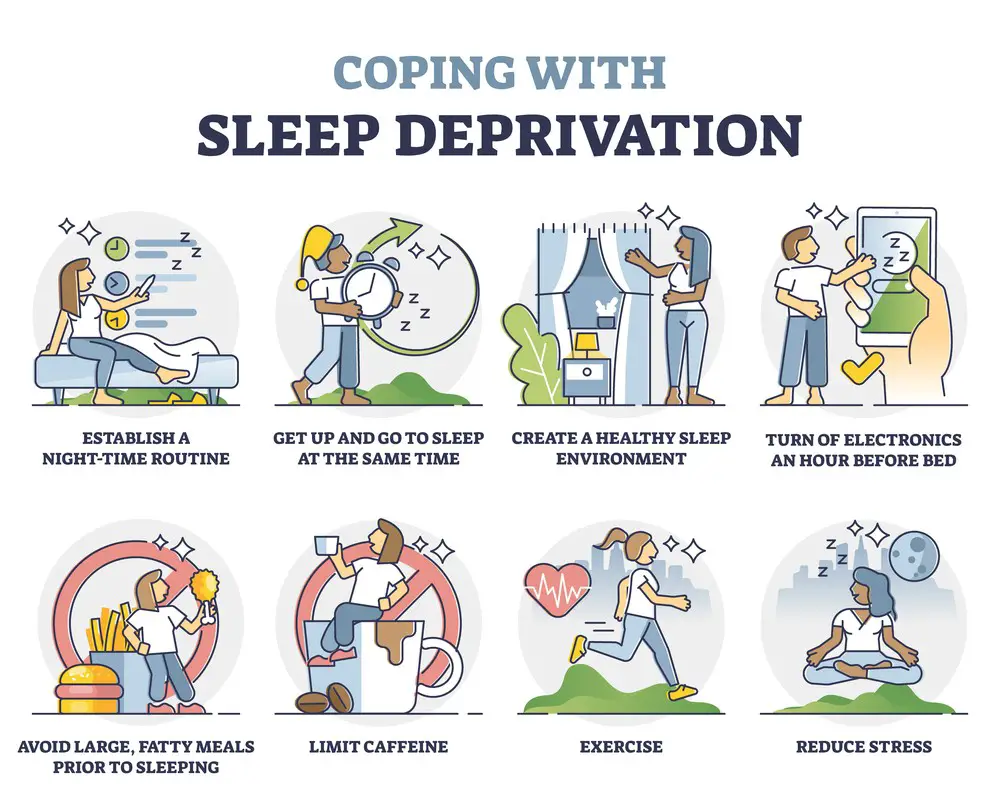As a BetterHelp affiliate, we receive compensation from BetterHelp if you purchase products or services through the links provided
A sore throat is often the first sign that a cold is on its way, and it can make even the simplest tasks, like swallowing and talking, feel like a challenge. But when it comes to sleep, a sore throat can turn a previously boiled night into a restless, uncomfortable ordeal. So, how can you sleep comfortably with a sore throat and wake up refreshed? This blog post will discuss “how to sleep with a sore throat” effectively.
We’ll explore the causes and symptoms of sore throats, provide tips for home remedies and sleeping positions that can help you get a restful night’s sleep, and discuss how to create a soothing sleep environment and bedtime routines for sore throat relief.
Understanding Sore Throats
A sore throat is an inflammation of the throat that can result in pain, itching, and difficulty swallowing. It can be caused by a bacterial infection, such as strep throat, or other factors like allergies, colds, flu, and snoring. The symptoms of a sore throat include a scratchy or painful sensation, difficulty swallowing, and a dry or hoarse voice. In some cases, a severe sore throat may require medical attention.
Comprehending the causes and types of sore throats can assist in taking steps to lessen the discomfort and enhance sleep quality. We will examine the factors behind sore throats and why they challenge restful sleep.
What Causes a Sore Throat?
Several factors can lead to a sore throat. Illnesses like the flu, cold, COVID-19, and sleep apnea often cause sore throats. Allergies, smoke, and dry air can also contribute to sore throats. Symptoms may include a scratchy or burning sensation in the throat, difficulty swallowing, and swollen glands. Preventing a morning sore throat requires hydration, removing irritants, maintaining hand hygiene, and getting necessary immunizations.
Blocked nasal passages due to dry environments, allergies, colds, or flu can lead to mouth breathing, which may result in a sore throat. A runny nose and a stuffy nose can also contribute to these issues. Thus, it’s imperative to establish methods of keeping nasal passages clear and maintaining a humid environment to prevent the onset or escalation of a sore throat.
 Why Sleep Is Challenging with a Sore Throat
Why Sleep Is Challenging with a Sore Throat
A sore throat can present with the following symptoms:
- Discomfort
- Pain
- Difficulty swallowing
- Impact on sleep quality
Cold symptoms often accompany these symptoms. The pain and discomfort caused by a sore throat can make falling asleep difficult, leaving you tired and drained the next day. If your symptoms persist, it’s essential to consult a healthcare professional.
Some remedies for soothing a sore throat and promoting sleep include:
- Gargling with salt water
- Consuming a warm beverage
- Taking over-the-counter pain relievers
- Elevating your head while sleeping
Tips for Sleeping with a Sore Throat
If you’re struggling to sleep with a sore throat, several tips and remedies can help alleviate your discomfort and improve your sleep quality. From home remedies to proper sleeping positions, these tips can help you get a good night’s sleep even with a sore throat.
First, explore some home remedies that can help soothe your throat and make it easier to fall asleep. These remedies can be easily implemented at home and can provide temporary relief from the discomfort associated with a sore throat.
Home Remedies for Relief
Staying hydrated and consuming warm liquids can help reduce sore throat discomfort and alleviate the inflammation caused by bacterial infections or strep throat. Drinking hot tea, chicken soup, or even warm water can relieve and help soothe your throat.
A humidifier can help maintain a moist atmosphere in your bedroom, reducing throat irritation. An air purifier can also help reduce airborne irritants contributing to a sore throat. A hot shower can provide temporary relief by creating a steamy environment. Throat sprays may also be considered for alleviating discomfort.
In addition to maintaining proper humidity levels, over-the-counter medications like ibuprofen, acetaminophen, and throat lozenges can reduce throat pain and inflammation associated with a sore throat.
Sleeping Positions and Pillows
Sleeping on your side with your head elevated can be beneficial in decreasing snoring and congestion, which can help alleviate sore throat pain. Raising your head can help clear nasal passages and facilitate congestion drainage, making breathing and sleeping easier.
Choosing the right pillow is crucial for ensuring comfort while sleeping with a sore throat. Opt for a soft pillow that supports your head and neck, maintaining a neutral alignment. This can help lessen the pressure on your throat and facilitate breathing, making it easier to fall asleep and stay asleep throughout the night.
Preparing Your Bedroom for Better Sleep
Creating a soothing sleep environment and adopting bedtime routines that help alleviate sore throat discomfort can significantly improve your sleep quality. By optimizing your sleep environment and incorporating helpful bedtime routines, you can make it easier to fall asleep and stay asleep, even with a sore throat.
This section will explain how to create a calming sleep environment by managing:
- Temperature
- Humidity
- Allergens
- Darkness
- Noise
We will also explore beneficial bedtime routines that can lessen sore throat discomfort and encourage restful sleep.
 Creating a Soothing Sleep Environment
Creating a Soothing Sleep Environment
Keeping your bedroom at an optimal temperature and humidity is key to a comfortable sleep environment. A temperature between 60-67 degrees Fahrenheit can foster a good night’s sleep, even with a sore throat. A humidifier can help maintain a humidity level of 30-50%, reducing throat irritation and creating a humid atmosphere.
Reducing allergens in your bedroom can also help alleviate sore throat discomfort. Be sure to clean and vacuum your bedroom regularly, wash your bedding in hot water to kill dust mites, and use an air purifier to remove airborne irritants.
Additionally, controlling darkness and noise in your bedroom can improve sleep quality. Utilize blackout curtains, eye masks, and white noise machines to create a calm and peaceful sleep environment.
Bedtime Routines for Sore Throat Relief
Before bedtime, consider gargling with warm salt water to soothe a sore throat, reduce inflammation, and eliminate bacteria. This simple yet effective remedy can help relieve soreness and make it easier to fall asleep. Using throat lozenges before bed can also help moisten your throat and alleviate discomfort.
Incorporating relaxation techniques into your bedtime routine can help you unwind and prepare your body and mind for a good night’s sleep. Practices such as deep breathing, meditation, or gentle stretching can help you feel more relaxed and make it easier to fall asleep and stay asleep throughout the night.
When It’s Time to Seek Professional Help
As you navigate the discomfort of a sore throat and its impact on your sleep, it’s essential to know when home remedies aren’t cutting it. Here are some signs that you may need professional medical intervention:
- Persistent symptoms: If your sore throat lasts longer than 7-10 days despite trying various home remedies.
- Additional symptoms: High fever, difficulty swallowing or breathing, and swollen glands can be red flags.
- Recurring issues: Frequent sore throats might indicate an underlying issue that needs a more comprehensive treatment plan.
Setting Goals for Treatment
Setting clear and achievable goals is helpful if you find yourself seeking professional help for your sore throat and its impact on your sleep. Here’s how:
- Identify the Root Cause: Working with your healthcare provider, aim to identify the underlying cause of your symptoms.
- Select the Right Treatment: From antibiotics to lifestyle changes, align on the most effective treatment.
- Improve Sleep Quality: Set goals to get a certain number of hours of uninterrupted sleep.
- Prevention: Identify steps to minimize future occurrences, like avoiding irritants or staying hydrated.
Recognizing Progress: Celebrate the Small Wins
Progress isn’t always linear, but even minor improvements can be signs that your treatment plan is working:
- Symptom Relief: Fewer nights disrupted by a sore throat is a definite win.
- Improved Energy: Better sleep quality can increase energy during the day.
- Fewer Episodes: Achieving fewer instances of a sore throat or related issues strongly indicates progress over time.
Remember, achieving these milestones doesn’t just happen overnight; it’s a journey. Celebrate your progress and adjust your goals to improve your sleep quality and overall well-being.
Conclusion
Sleeping comfortably with a sore throat can be challenging, but with the right tips and advice, achieving a restful night’s sleep is possible. Understanding the causes and symptoms of sore throats, implementing home remedies and proper sleeping positions, and creating a soothing sleep environment can alleviate discomfort and improve sleep quality.
Remember to stay hydrated, consume warm liquids, use a humidifier, and take over-the-counter medications as needed to help soothe your sore throat. Maintain a comfortable sleep environment by controlling temperature, humidity, and allergens, and adopt bedtime routines that promote relaxation and sore throat relief.
FAQs: Your Burning Questions on Sleeping with a Sore Throat Answered
 How long should I expect a sore throat to affect my sleep?
How long should I expect a sore throat to affect my sleep?
A sore throat caused by a viral infection like the common cold usually lasts 5 to 7 days. However, if it results from a bacterial infection like strep throat, it may persist until treated with antibiotics. If your sore throat disrupts your sleep for over a week, consult a healthcare provider.
Are there any natural remedies I can try for quick relief?
Absolutely! Warm honey-lemon water, chamomile tea, and even simple warm saltwater gargles can offer quick relief. A few drops of peppermint or eucalyptus oil in a humidifier might work wonders if you’re into essential oils.
Can I use ice to numb the sore throat?
You sure can. Ice can numb the area temporarily, giving you a window of relief that might help you fall asleep. Just avoid chewing the ice, as it can irritate the throat further.
Is it better to sleep in a certain position when I have a sore throat?
Indeed! Sleeping on your side with your head elevated can reduce snoring and relieve congestion, helping ease your sore throat.
Should I skip my workout if I have a sore throat?
Light to moderate exercise can boost your immune system. But it might be best to rest if you’re feeling particularly run down or have other symptoms like fever and body aches.
Can stuffed animals help?
If you find comfort in cuddling stuffed animals, go for it! Emotional comfort can help you relax, which may help you sleep better, even with a sore throat. Just make sure your cuddly friends are clean to avoid any additional irritants.
When should I definitely see a doctor?
If your sore throat persists for more than a week, is accompanied by a high fever or swollen glands, or if you have difficulty breathing or swallowing, medical attention is advisable.
- Left Arm Pain and Anxiety: Understanding the Relationship - November 23, 2023
- Anxiety Paralysis: Coping with Overwhelming Stress - November 23, 2023
- Anxious vs. Nervous: Differentiating Emotions and Responses - November 15, 2023
This site contains affiliate links to products. We will receive a commission for purchases made through these links.



 Why Sleep Is Challenging with a Sore Throat
Why Sleep Is Challenging with a Sore Throat
 Creating a Soothing Sleep Environment
Creating a Soothing Sleep Environment How long should I expect a sore throat to affect my sleep?
How long should I expect a sore throat to affect my sleep?
